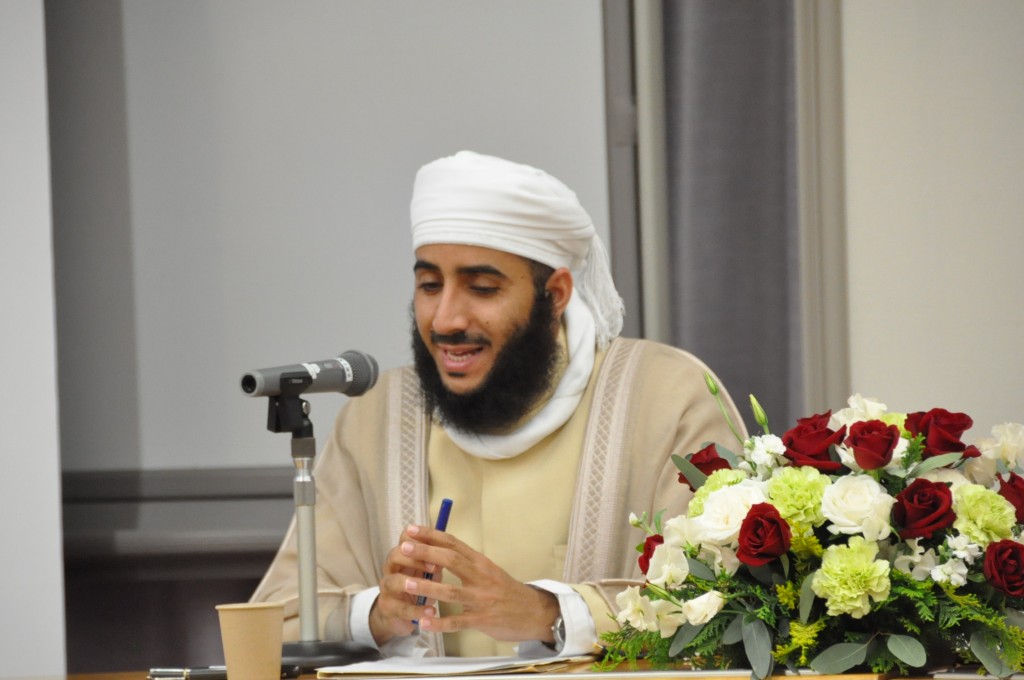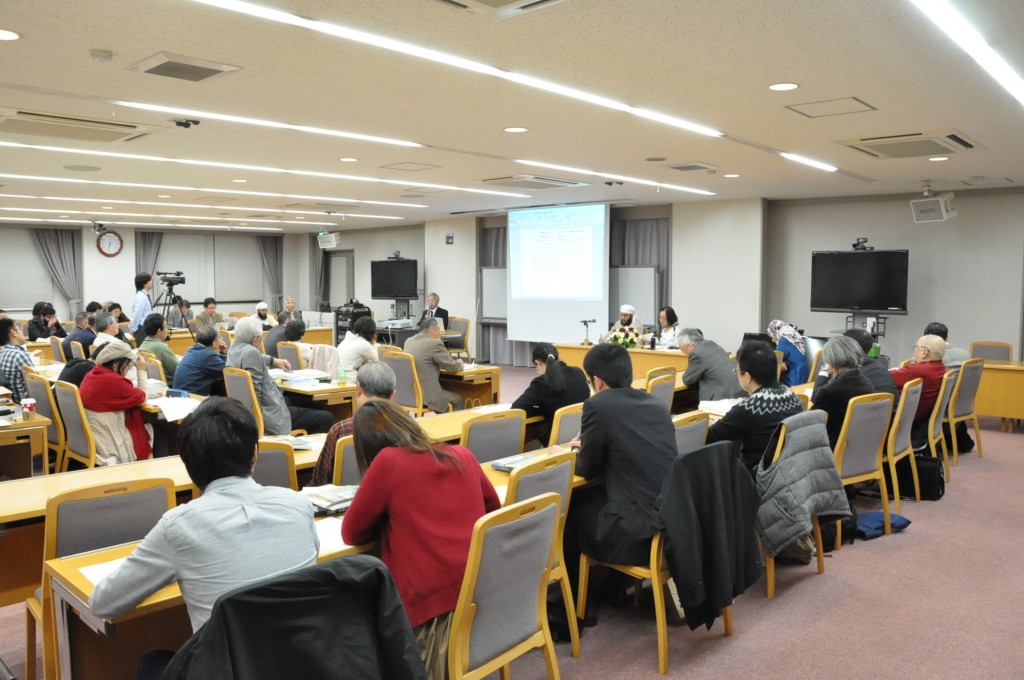Center for Interdisciplinary Study of Monotheistic Religions(CISMOR)Doshisha University
> Public Lectures > The Effort of Muslim Scholars in Oman in the Deployment of ModerationPublic Lectures
The Effort of Muslim Scholars in Oman in the Deployment of Moderation
| Date: |
2012/11/12 17:00− 19:00 |
|---|---|
| Place: | Conference room Neisei-kan 5F, Imadegawa Campus, Doshisha University |
| Lecture: |
Dr. Kahlan Nabhan Al-Kharusi (Assistant of Grand Mufti, Oman) |
| Summary: | |
|
A lecture titled “The Effort of Muslim Scholars in Oman in the Deployment of Moderation” was delivered by Dr. Kahlan Nabhan Al-Kharusi, Assistant of Grand Mufti, Ministry of Awqaf and Religious Affairs, Oman, a country located in the Arabian Peninsula. He began the lecture by presenting three viewpoints: moderation, Oman, and the efforts of Muslim scholars. The lecture consisted of the following four parts: (1) a geography and history of Oman, (2) the definition of moderateness, (3) the basis of moderateness, and (4) today’s Oman. (1) Geography and history of Oman: Oman sits in a geopolitically and strategically important area. Geographically, the country is located at the southeastern part of the Arabian Peninsula and faces the Oman Gulf and the Arabian Sea, which connects to the Indian Ocean. Backed by its geographical advantage, Oman has maintained its presence as an independent trade state since ancient times and has developed its own civilization. Oman accepted Islam in 629, not forcefully by war, but through internal discussions held by Oman’s royal family members upon the receipt of a letter from Muhammad that encouraged them to have faith in Islam. Thus, Islam was introduced to Oman peacefully. (2) Definition of moderateness: The lecturer discussed the meaning of “moderateness” by referring to the Oxford English Dictionary. According to this dictionary, “moderateness” means being rational and avoiding extremes. More importantly, however, he argued that the degree of moderateness should be measured in light of the actions that people have chosen to take, and from this viewpoint, he explained the current situation of Oman. (3) Basis of moderateness: The moderateness of Oman is based on four factors: religion, civilization, knowledge & education, and the leadership of the sultan. First, moderateness is incorporated in the Islamic teachings as one of the basic principles. Islam embraces tolerance and diversity according to the doctrine of the Qur’an. Second, traditional social systems and the stable state management backed by these systems have contributed to the civilization of Oman. As a result, this country has continued to serve as a hub of trading and expanded international exchanges, which has enabled the people of Oman to have dialogue with people with different backgrounds in various areas. Third is knowledge and education. In Oman, unceasing effort has been underway to address newly arising situations in a manner that suits the people of Oman, based on the traditional heritage of moral and ethics. Such a process is called ijtihad. While the basic teaching of Islam has remained unchanged, new problems arise and new incidents take place on a daily basis. Under the circumstances, effort has been made to rationally find out how to deal with these newly arising situations in a manner consistent with the teachings of Islam, and Muslim scholars have been playing a leading role in this effort. Here, ignorance is considered extremely unfavorable, and the availability of an environment that is constantly open to knowledge and conducive to learning is crucial for avoiding extremes and cultivating the spirit of tolerance. Fourth, it is important to note that Oman has undergone development under the leadership of the present Sultan Qaboos. While the sultanate system is in place in Oman, the country also has a council that plays a parliamentary role. In addition, the sultan frequently travels around the country and thus has a good understanding of domestic affairs. The current economic prosperity of Oman is attributable to the policy implemented by the present sultan. (4) Today’s Oman: As mentioned above, Oman today boasts a long-held tradition of tolerance based on the doctrine of Islam. Characteristically, the people of Oman are moralistic and friendly, and have a long history of interactions with people around the world. For example, the people of Oman have fostered close ties with Japan, China, India, and West Africa, based on mutual respect. In concluding, Dr. Kahlan Nabhan Al-Kharusi made mention of the support extended by Oman to those affected by the Great East Japan Earthquake that occurred in 2011, and emphasized the importance of increasing public awareness regarding the strong bond between Oman and Japan. Then, Professor Junya Shinohe of Doshisha University offered comments on the lecture, followed by a lively exchange of questions and answers. One participant asked about the possibility of the ongoing moderate policy, which is carried out under the leadership of the present sultan, being abandoned by a succeeding sultan in the future. To this question, Dr. Kahlan Nabhan Al-Kharusi answered that such a situation is unlikely, as sultans take into consideration the tradition and current situation of the country when making a decision, and there is no way for sultans to be dictatorial in the decision-making process. Other questions concern the decision-making authority of Muftis and their political and social influence. (Norimasa Fujimoto, Research Assistant, Graduate Student of School of Theology, Doshisha University) |
|
|
*This lecture will be given in English. *Admission Free, No Reservation Necessary. Hosted by: CISMOR Co-hosted by: School of Theology, Doshisha University |
|
|
Program (Japanese) |
|

